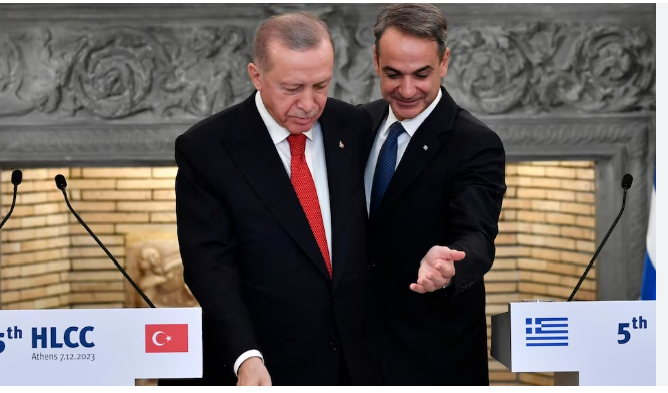Veteran Turkish foreign policy analysts Mrs Zeynep Gurcanli explains why Turkish President Erdogan buried the war hatchet with Greece.
“The AK Party government attributed great meaning to the Greece visit. There is an opinion in Ankara that Turkey’s road to the European Union passes through Athens. Moreover, not only relations with the EU, but also the softening in the Ankara-Washington line is attributed to the calm in the Eastern Mediterranean. As a matter of fact, wasn’t the USA the first country to announce that it “welcomed” the good neighborly declaration announced by Erdoğan and Mitsotakis?
Add to this the prisoner exchange agreement between Azerbaijan and Armenia, which coincided with the Turkish-Greek rapprochement; For Washington, “things are going well” in the Eastern Mediterranean and the Caucasus”.
To recall, only a year ago, Erdogan threatened war with Greece by reciting a famous love song “I may arrive at your doorstep suddenly one eve’”, and stating that Mitsotakis “failed to exits for him”.
Euractive confirms Gurcanli’s observation:
Diplomatic circles in Athens interpreted Turkish President Recep Tayyip Erdoğan’s new moderate stance as an attempt to re-approach the West following recent disagreements on key foreign issues such as Russia’s war in Ukraine and the Israel-Hamas war.
In recent years, relations between Greece and Turkey have not been easy and often topped the EU agenda following pressure from Athens.
Ankara questioned the sovereignty of Greek islands in the Aegean Sea, and government officials even threatened with war “at night”. In May 2022, Erdoğan said Greek Prime Minister Kyriakos Mitsotakis “did not exist” for him.
In several conclusions of EU high-level meetings, EU leaders warned Turkey – whose EU accession talks have been frozen – to de-escalate and return to dialogue.
But the turmoil de-escalated drastically last summer after Erdoğan and Mitsotakis triumphed in their national elections, which almost coincided.
Taking advantage of their safe government majority, the two countries are now eyeing a rapprochement to turn the page and end endless defence spending which makes a significant dent in their budgets,
According to the Erdogan-Mitsotakis agreement, the two sides shall endeavour to settle any dispute arising between them amicably,
by direct consultation,
or by other means of mutual choice, as provided for in the Charter of the United Nations.
The “hardcore politics” will be left for discussion at a later stage, depending on the progress of yesterday’s agreements.
Particularly, critics in Athens suggest that yesterday’s deals will be the foundation of an upcoming dialogue to tackle sensitive political issues such as the delimitation of the continental shelf and Exclusive Economic Zone in the Aegean and the Eastern Mediterranean – the two issues Athens recognises as only “pending” between the two countries.
For its part, Turkey wants to put other issues on the agenda, such as the demilitarisation of Greek islands neighbouring coastal Turkey and a Muslim minority in northeastern Greece, which Turkey brands as “Turkish”.
Erdoğan showed another face
Greek media quoted diplomatic circles as saying it’s not a coincidence that the Turkish president showed a completely different face at Thursday’s meetings.
The diplomatic circles estimated that through Greece, Erdoğan wanted to send a message to Europe and beyond that, Turkey now adopts a more moderate attitude.
The EU expects the countries in negotiations to join the bloc to fully align with its foreign policy choices, which is not the case for Turkey.
Despite major differences in the diplomatic arena, EU countries see Turkey as a key player in the region, especially regarding migration.
Turkey has been hosting for years millions of refugees from Syria and gets EU financial support, keeping a severe headache away from EU capitals.
It is not clear though whether the “new, friendly” Erdogan will persuade EU leaders in the upcoming year-end summit to greenlight a Commission Special Report recommending negotiations on a new Customs Union with Turkey.
Follow our English language YouTube videos @ REAL TURKEY: https://www.youtube.com/channel/UCKpFJB4GFiNkhmpVZQ_d9Rg
And content at Twitter: @AtillaEng
Facebook: Real Turkey Channel: https://www.facebook.com/realturkeychannel/
